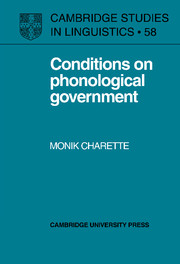Book contents
- Frontmatter
- Contents
- Preface
- Introduction
- 1 A theory of government in phonology
- 2 The ‘e-muet’ in French
- 3 Earlier treatments of schwa
- 4 An analysis of schwa in terms of government
- 5 Licence to govern
- 6 Word-final empty nuclei
- 7 Compounds and phrases
- 8 The alternation between schwa/zero and [ɛ]
- 9 Miscellaneous issues
- Conclusion
- Notes
- References
- Index
- Recent titles in Cambridge Studies in Linguistics
9 - Miscellaneous issues
Published online by Cambridge University Press: 10 December 2009
- Frontmatter
- Contents
- Preface
- Introduction
- 1 A theory of government in phonology
- 2 The ‘e-muet’ in French
- 3 Earlier treatments of schwa
- 4 An analysis of schwa in terms of government
- 5 Licence to govern
- 6 Word-final empty nuclei
- 7 Compounds and phrases
- 8 The alternation between schwa/zero and [ɛ]
- 9 Miscellaneous issues
- Conclusion
- Notes
- References
- Index
- Recent titles in Cambridge Studies in Linguistics
Summary
Introduction
I conclude the analysis of schwa by considering some additional contexts where schwa alternates with zero. While some of the facts discussed in this chapter follow directly from my analysis, some others do not. Some of the data do appear problematic for my treatment of schwa. In these instances I do not always have a clear understanding of the behaviour of the data, but I nevertheless suggest a direction of research which might be worth exploring. I also reconsider the controversial behaviour of schwa occurring in word-initial syllables. In attributing to a word-initial syllable a special status, I capture similarities between French and other languages and I account for the difference between Quebec and Parisian French with regard to the behaviour of empty nuclei in word-initial syllables of bisyllabic words. Finally, it follows from my proposal that the two dialects differ as far as proper government of an empty nucleus in initial syllable of bisyllabic words is concerned, but are similar in their treatment of this nucleus in initial position of polysyllabic words. I start with sequences of clitics, one of the classical problems with respect to the behaviour of adjacent schwas.
Sequences of clitics
Without going into a detailed syntactic analysis of clitics, we may roughly say that syntactically object clitics are always attached to a verb.
- Type
- Chapter
- Information
- Conditions on Phonological Government , pp. 196 - 205Publisher: Cambridge University PressPrint publication year: 1991



